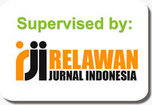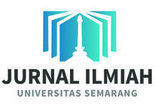Pengembangan Laboratorium Virtual Bermuatan Project-Based Learning Berbasis Android Untuk Meningkatkan Pemahaman Siswa SMK Pada Mata Pelajaran Komputer Dan Jaringan Dasar
Abstract
The Covid-19 outbreak has changed the learning system in Indonesia from face to face to distance. This causes the practicum learning process to experience difficulties because the practicum requires a real laboratory so that practicum activities can be carried out. Therefore, to solve these problems through the development of virtual laboratory learning media containing Android-based PjBL to improve student understanding. The existence of a virtual laboratory allows students to carry out practical simulations through these learning media flexibly. The development method used is Successive Approximation Model 1 with 3 iterative stages, namely (1) Evaluate, (2) Design, and (3) Develop. The test results of user testing get a percentage value of 88.17% with a very valid category. It was concluded that the learning media developed was very feasible to use and quite effective in increasing the understanding of SMK students majoring in TKJ on Computer and Basic Network subjects.
Keywords
References
A. Purwanto et al., Studi Eksploratif Dampak Pandemi COVID-19 Terhadap Proses Pembelajaran Online di Sekolah Dasar, EduPsyCouns J. Educ. Psychol. Couns., vol. 2, no. 1, pp. 1 12, 2020, [Online]. Available: https://ummaspul.e-journal.id/Edupsycouns/article/view/397.
A. S. Syarifudin, Impelementasi Pembelajaran Daring Untuk Meningkatkan Mutu Pendidikan Sebagai Dampak Diterapkannya Social Distancing, J. Pendidik. Bhs. dan Sastra Indones. Met., vol. 5, no. 1, pp. 31 34, 2020, doi: 10.21107/metalingua.v5i1.7072.
N. I. KurbanoÇ lu and A. Akin, The relationships between university students organic chemistry anxiety, chemistry attitudes, and self-eficacy: A structural equation model, J. Balt. Sci. Educ., vol. 11, no. 4, pp. 347 356, 2012.
G. A. Buck, V. L. P. Clark, D. Leslie-Pelecky, Y. Lu, and P. Cerda-Lizarraga, Examining the cognitive processes used by adolescent girls and women scientists in identifying science role models: A feminist approach., Sci. Educ., vol. 92, no. 4, pp. 688 707, 2008, doi: 10.1002/sce.20257.
StatCounter, android_version-ID-monthly-202008-202108. 2021, [Online]. Available: https://gs.statcounter.com/android-version-market-share/mobile-tablet/worldwide/#monthly-201706-202108.
D. L. Payne, Mapping SAM to ADDIE, Calif. State Univ. Monterey Bay, 2016.
M. W. Allen, Leaving ADDIE for SAM: An agile model for developing the best learning experiences. American Society for Training and Development, 2012.
R. A. Pradana, A. A. Supianto, and A. D. Herlambang, Pengembangan Platform Pelatihan Programming DB2 berbasis Moodle menggunakan Successive Approximation Model ( SAM ), vol. 5, no. 5, 2021.
L. R. Gay, G. E. Mills, and P. W. Airasian, Educational researchcompetencies for analysis and applications. Merrill/Pearson, 2009.
Sugiyono, Metode Penelitian Bisnis: Pendekatan Kuantitatif, Kualitatif, Kombinasi, dan R&D, Penerbit CV. Alf. Bandung, 2017.
S. Akbar, Instrumen Perangkat Perangkat Pembelajaran, Bandung PT. Remaja Rosdakarya Offset, 2013.
A. Suharsimi, Dasar-dasar Evaluasi Pendidikan, Jakarta: Bumi Aksara ed, Revisi, cet, vol. 8, 2008.
A. Suharsimi, Prosedur penelitian, Jakarta: Rineka Cipta, 2006.
R. R. Hake, Analyzing change/gain scores. Indiana: Indiana University, 1999.
A. S. Rosa, Rekayasa perangkat lunak terstruktur dan berorientasi objek, 2016.
DOI: http://dx.doi.org/10.26623/transformatika.v20i2.5029
Refbacks
- There are currently no refbacks.
| View My Stats |
Jurnal Transformatika : Journal Information Technology by Department of Information Technology, Faculty of Information Technology and Communication, Semarang University is licensed under a Creative Commons Attribution 4.0 International License.









